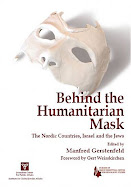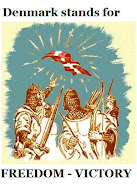Rewriting our history to fit a political agenda stinks of totalitarianism such as Hitler's, Stalin's, Mussolin's, Mao's and other similar Marxoid regimes - Today the multiculturalist fascists are doing exactly the same from a similar ideological agenda.
Fjordman wrote this essay for Dhimmiwatch.
Hardly a week goes by without somebody claiming that Muslims and Westerners have a "shared cultural heritage." I strongly object to this claim. The only "shared history" Europeans have with Muslims is being at the receiving end of more than 1300 years of Jihad warfare. The re-writing of Western history has become so bad that even playwright William Shakespeare has been proclaimed a closet Muslim. "Shakespeare would have delighted in Sufism," said the Islamic scholar Martin Lings, himself a Sufi Muslim, in 2004. According to The Guardian, Lings argued that Shakespeare's work "resembles the teachings of the Islamic Sufi sect" in the International Shakespeare Globe Fellowship Lecture at Shakespeare's own Globe Theatre in London. Lings spoke during Islam Awareness Week.
Muslims is being at the receiving end of more than 1300 years of Jihad warfare. The re-writing of Western history has become so bad that even playwright William Shakespeare has been proclaimed a closet Muslim. "Shakespeare would have delighted in Sufism," said the Islamic scholar Martin Lings, himself a Sufi Muslim, in 2004. According to The Guardian, Lings argued that Shakespeare's work "resembles the teachings of the Islamic Sufi sect" in the International Shakespeare Globe Fellowship Lecture at Shakespeare's own Globe Theatre in London. Lings spoke during Islam Awareness Week.
As Robert Spencer commented back then, "Shakespeare is just the latest paradigmatic figure of Western Christian culture to be remade in a Muslim-friendly manner: recently the State Department asserted, without a shred of evidence, that Christopher Columbus (who in fact praised Ferdinand and Isabella for driving the Muslims out of Spain) was aided on his voyages by a Muslim navigator. It is a sign of the times when this kind of thinking is no longer confined to Islamic apologetics websites, but is taken up by the Globe Theatre and the U.S. State Department — hardly representatives of the cultural fringes — and even American textbook publishers. The state of American education is so dismal today that teachers themselves are ill-equipped to counter these historical fantasies. They will become willing propagators of the new history: nothing to fear from Muslims, you see. Shakespeare was one of them. Oh yes, and Goethe. And Abraham Lincoln's mother."
The funny part is that the concept of "theater" hardly existed in medieval or early modern Islam. There was no Muslim Shakespeare because there could be no Muslim Shakespeare. It's yet another part of the Greco-Roman heritage which was not "shared, preserved and passed on to us" by Muslims since they were never interested in it even at the best of times.
Hebrew had been dead as a spoken language for centuries already in Roman times, but it was the language of the Hebrew Bible, and a Jew such as Jesus of Nazareth would almost certainly have known some Hebrew. He would most likely also have been familiar with the languages of the two previous empires that had ruled the Levant, the Aramaic of the Persians (and the Assyrians) and the Greek of Alexander the Great's empire. The one language he didn't know was Latin. The extent to which he spoke these languages is disputed, but it's likely that he knew something of all three. Jesus, who founded the religion which was to become Christianity, probably spoke at least some Greek. I'm pretty sure Muhammad did not.
Paul, the person who shaped Christianity more than anybody next to Jesus, was a Jew, butalso a Roman citizen. Although the relationship between the Roman state and the adherents of the new religion was complex (some of the early Christians were executed by Roman authorities, including the founder himself), Christianity grew and eventually conquered the Roman Empire from within. Christianity was a Roman religion from the very beginning. It would be fair to say that it was born out of a Jewish conceptual universe, but was shaped in a Greco-Roman environment and baptized in a spring of Greek philosophy and Roman law.
When the American Founding Fathers in the eighteenth century discussed how the shape of their young Republic should be, they were influenced by, in addition to the English parliament and the French thinker Montesquieu (who was inspired by the British political system), descriptions of democratic Athens and the Roman Republic through Aristotle's political texts and Cicero's writings, among other things. None of these texts were ever available in Arabic, Persian or Turkish translations. Cicero was extremely influential in European thought from the Renaissance through the Scientific Revolution to the Enlightenment, yet totally ignored by Muslims. Roman law is secular and changeable, unlike sharia which is eternal and institutes a religious apartheid system. Roman law was used by Europeans, but not by Muslims. Of the Greek heritage, Muslims even during the so-called "golden age" were uninterested in the concept of democracy, men ruling themselves according to man-made laws.
One of the reasons why Greek natural philosophy was so quickly assimilated into European universities during the Middle Ages, in sharp contrast to Islamic madrasas, was that the earliest Christian theologians were familiar with Greek philosophy and borrowed from its vocabulary and conceptual universe. For Muslims who came from the Arabian Peninsula, the Greco-Roman legacy was an alien intrusion which their cultural immune system failed to fully internalize and eventually rejected. This does not mean that they never borrowed from it when it suited them. They did; but it was never "theirs." For Christianity it was one of its two parent cultures, the other being the Jewish spiritual legacy as contained in the Hebrew Bible. This had practical consequences, for instance in the positive Christian view of pictorial art, which came from the Greco-Roman parent culture. This was never shared by Muslims.
Art is never just "art." It always reflects the world-view of a particular culture. Islamic art has usually been quite sterile. Muslims have created some miniature paintings, but never anything comparable to Western art or ancient Greek art for that matter, and virtually no sculptures. In contrast, the Greek artistic legacy left a major imprint on early Buddhist art and sculpture in the border regions of northern India, after Alexander the Great's conquests. You could thus argue successfully that Westerners share a "Greek legacy" with Asian Buddhist-influenced cultures more than with Muslims. To me, the Islamic failure to fully internalize Greek science is indicated by their failure to internalize the Greek spirit as reflected in arts and politics.
I could add that Christians and Jews, as well as most of the pre-Islamic peoples of the Middle East, from ancient Egyptians and Sumerians to Phoenicians and Persians, accepted wine, beer and other alcoholic beverages as a part of their culture, even as a part of their religious culture. Muslims never formally did this. The Middle East went from being a global center of civilization to a global center of anti-civilization during its Islamization. This corresponds roughly to the time when wine and beer were enjoyed as an accepted part of the culture, which it was in pre-Islamic times and still is for non-Muslims. The Japanese had drinking games in medieval times. They still have this, only now they call it "karaoke." I know of virtually no advanced civilization, from the Chinese to the Mayas in pre-Columbian Mesoamerica, who did not enjoy some form of fermented beverage. Wine is civilization. Wine and beer.
The idea of a "shared monotheism" is false, too. Christianity with its concept of the Trinity is akin to soft-polytheism from an Islamic point of view. The religious texts are clearly different, not to mention the personal examples of the founders of the two religions, Jesus and Muhammad. Islam became a major world religion through armed conquest and the creation of an empire. Christianity became a major world religion by gradually taking over an already established empire, the Roman Empire. Moreover, the Zoroastrian and Jewish communities in the Middle East (except for Israel) have been all but wiped out by Muslims, and the Christian communities are in serious decline.
A researcher from Denmark, Tina Magaard, has spent years analyzing the original texts of different religions, from Buddhism to Sikhism, and concludes that the Islamic texts are by far the most warlike among the major religions of the world. They encourage terror and fighting to a far larger degree than the original texts of other religions. "The texts in Islam distinguish themselves from the texts of other religions by encouraging violence and aggression against people with other religious beliefs to a larger degree. There are also straightforward calls for terror. This has long been a taboo in the research into Islam, but it is a fact that we need to deal with," says Magaard. Moreover, there are hundreds of calls in the Koran for fighting against people of other faiths. "If it is correct that many Muslims view the Koran as the literal words of God, which cannot be interpreted or rephrased, then we have a problem. It is indisputable that the texts encourage terror and violence. Consequently, it must be reasonable to ask Muslims themselves how they relate to the text, if they read it as it is," she says.
The main problem with Islam isn't that it is a stupid religion, as some people say, but that it is a violent one. I personally consider Scientology to be a stupid creed, but I haven't heard about many people living in fear that Tom Cruise will cut off their head while quoting poems of L. Ron Hubbard and then post a video of the deed on the Internet. Christianity and Judaism are NOT like Islam. The concept of Jihad is unique to Islam among all major religions.
We do have a shared humanity with Muslims, as we do with everybody else, but we do not have a shared heritage with them. Even the Greek scientific legacy was used differently by Europeans, as I will show later in my history of optics.
































No comments:
Post a Comment